 In this story by Patricia Grace, an indigenous New Zealand farmer’s wife describes the day’s events to her newborn baby. She begins by telling him how free and alive she felt upon waking that morning, and about her family’s chaotic farewell as they dropped her off at the hospital. She then describes her friendly banter with the nursing staff (she knows them well as this is the eighth baby she has had there!), and concludes with quiet time after the delivery bonding with and talking affectionately to the child. Themes include procreation, nurturing, motherhood, envy/resentment, struggle, contentment. More…
In this story by Patricia Grace, an indigenous New Zealand farmer’s wife describes the day’s events to her newborn baby. She begins by telling him how free and alive she felt upon waking that morning, and about her family’s chaotic farewell as they dropped her off at the hospital. She then describes her friendly banter with the nursing staff (she knows them well as this is the eighth baby she has had there!), and concludes with quiet time after the delivery bonding with and talking affectionately to the child. Themes include procreation, nurturing, motherhood, envy/resentment, struggle, contentment. More…
Category Archives: Quick Reads
Counterfeit Bills
 Richard Matheson is renowned for his novels and traditional short stories in the fantasy, horror and science fiction genres. This is one of his few published flash stories, and the fact that it is a spoof of the science fiction cloning model makes it especially interesting. The story is based on the premise of how nice it would be to have a ‘double’ to carry out all the mundane tasks in your life, so you could spend all your time going out and having fun. Despite (or perhaps thanks to) the corny puns, it is a very enjoyable Quick Read. More…
Richard Matheson is renowned for his novels and traditional short stories in the fantasy, horror and science fiction genres. This is one of his few published flash stories, and the fact that it is a spoof of the science fiction cloning model makes it especially interesting. The story is based on the premise of how nice it would be to have a ‘double’ to carry out all the mundane tasks in your life, so you could spend all your time going out and having fun. Despite (or perhaps thanks to) the corny puns, it is a very enjoyable Quick Read. More…
The Romance of a Busy Broker
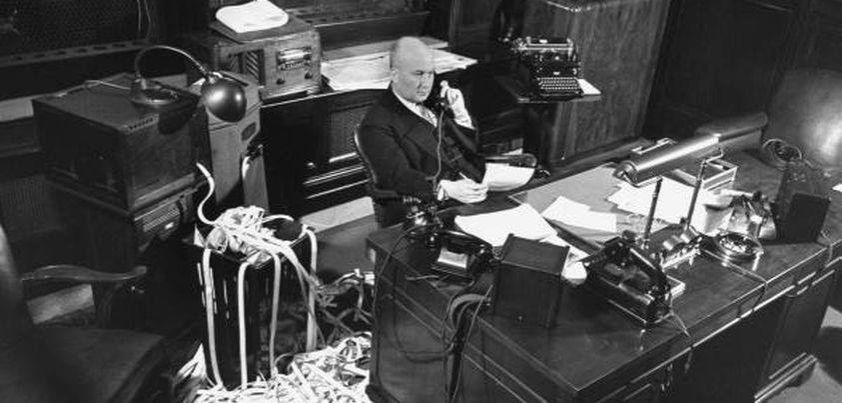 This humorous but unlikely story by O. Henry is set in the office of Harvey Maxwell, a busy New York stockbroker, over the space of a single morning. When Harvey sits down at his desk, it is as if he changes from a man into a machine. He puts everything else out of his mind. It is a bad day on the stock market and, when things get quieter at lunchtime, he realizes that he has forgotten something more important than making money. Themes include the pressure of ‘modern’ business, love, preoccupation, workplace conflict, gender roles. More…
This humorous but unlikely story by O. Henry is set in the office of Harvey Maxwell, a busy New York stockbroker, over the space of a single morning. When Harvey sits down at his desk, it is as if he changes from a man into a machine. He puts everything else out of his mind. It is a bad day on the stock market and, when things get quieter at lunchtime, he realizes that he has forgotten something more important than making money. Themes include the pressure of ‘modern’ business, love, preoccupation, workplace conflict, gender roles. More…
Voodoo
 This story by Fredric Brown explores the use of black magic to solve a marriage problem. Mr and Mrs Decker have decided on a divorce. Love has turned to hate, and the break-up is not friendly. The biggest issue they need to agree on is the financial settlement. Mrs Decker wants half of everything; Mr Decker thinks this is too much. She knows voodoo, and tells him she could use it to kill and him and get everything if he didn’t agree. This leads to an all-or-nothing bet. Themes include hatred, divorce, greed, the supernatural. More…
This story by Fredric Brown explores the use of black magic to solve a marriage problem. Mr and Mrs Decker have decided on a divorce. Love has turned to hate, and the break-up is not friendly. The biggest issue they need to agree on is the financial settlement. Mrs Decker wants half of everything; Mr Decker thinks this is too much. She knows voodoo, and tells him she could use it to kill and him and get everything if he didn’t agree. This leads to an all-or-nothing bet. Themes include hatred, divorce, greed, the supernatural. More…
The Wave
 The only “characters” in this vignette from Liam O’Flaherty are a cliff, waves, and “the wave”. Major themes include permanence, time, the power of nature/many. O’Flaherty was a noted Republican, and the story can be looked upon as a powerful allegory of Ireland’s struggle for independence. The cliff (Britain) stands firm and resolute, having successfully weathered many storms over its long history. Individually, the smaller waves (the Irish people) make little impression against its rocky walls. Working together, and combining to form “the wave”, they have enough power to begin breaking down the mighty cliff. More…
The only “characters” in this vignette from Liam O’Flaherty are a cliff, waves, and “the wave”. Major themes include permanence, time, the power of nature/many. O’Flaherty was a noted Republican, and the story can be looked upon as a powerful allegory of Ireland’s struggle for independence. The cliff (Britain) stands firm and resolute, having successfully weathered many storms over its long history. Individually, the smaller waves (the Irish people) make little impression against its rocky walls. Working together, and combining to form “the wave”, they have enough power to begin breaking down the mighty cliff. More…
The End of Something / Three-Day Blow
 These two Ernest Hemingway stories should ideally be read together as they are linked by storyline (the end of a relationship) and major themes (change, friendship and moving on). The lumber town of Hortons Bay has died and its people have left because all the old-growth trees have been cut down. Like the townspeople, Nick Adams is planning a new beginning. He has decided to break up with girlfriend Marjorie, telling her “it isn’t fun anymore”. We learn the reason in the second story, which introduces additional themes of class and/or racial prejudice, selfishness, mateship and regret. More…
These two Ernest Hemingway stories should ideally be read together as they are linked by storyline (the end of a relationship) and major themes (change, friendship and moving on). The lumber town of Hortons Bay has died and its people have left because all the old-growth trees have been cut down. Like the townspeople, Nick Adams is planning a new beginning. He has decided to break up with girlfriend Marjorie, telling her “it isn’t fun anymore”. We learn the reason in the second story, which introduces additional themes of class and/or racial prejudice, selfishness, mateship and regret. More…
The Snow Child
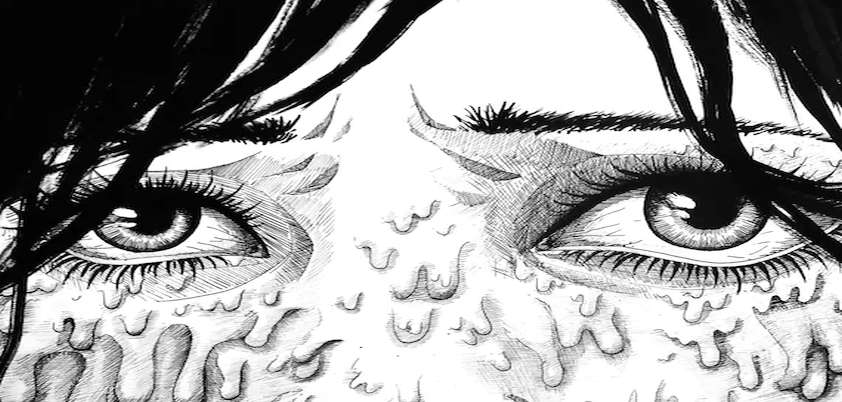 The main theme of Angela Carter’s Snow Child is feminist gender stereotyping. There are no heroes here. A powerful, dominating and lustful Count humiliates his wife by wishing for a young girl and clothing her in the vain Countess’s furs. His masculinity and dignity are then stripped away as he weeps while defiling the child’s dead body. The usually submissive Countess experiences a moment of power as the Count guiltily hands her the rose that killed the child. This passes when a thorn prick fails to kill her, proving that she lacks the sweet innocence of the snow child. More…
The main theme of Angela Carter’s Snow Child is feminist gender stereotyping. There are no heroes here. A powerful, dominating and lustful Count humiliates his wife by wishing for a young girl and clothing her in the vain Countess’s furs. His masculinity and dignity are then stripped away as he weeps while defiling the child’s dead body. The usually submissive Countess experiences a moment of power as the Count guiltily hands her the rose that killed the child. This passes when a thorn prick fails to kill her, proving that she lacks the sweet innocence of the snow child. More…
The End of Old Horse
 In this coming of age story by Simon Ortiz, “Old Horse” is a dog that chokes to death trying to free itself from a rope tying it to a pole. Earlier, two boys had observed the dog chewing at the rope and barking and snarling every once in a while. They mentioned this to its owner, a family friend, who replied that the dog is just being dumb. The rest of the story focuses on the boys’ reaction to what may have been their first experience with death and grief. Themes include freedom, loss, anger, grief, “manliness” and self-control, change. More…
In this coming of age story by Simon Ortiz, “Old Horse” is a dog that chokes to death trying to free itself from a rope tying it to a pole. Earlier, two boys had observed the dog chewing at the rope and barking and snarling every once in a while. They mentioned this to its owner, a family friend, who replied that the dog is just being dumb. The rest of the story focuses on the boys’ reaction to what may have been their first experience with death and grief. Themes include freedom, loss, anger, grief, “manliness” and self-control, change. More…
Powder
 This story from Tobias Wolff explores the relationship between a boy and his father at a time when his parent’s marriage is failing. The two have very different personalities. The boy is conservative and super-organized; the father carefree and irresponsible with little regard for rules. In order to return his son home from a skiing holiday in time for Christmas, the father disregards a police barrier and attempts a dangerous drive down a mountain in heavy snow. The boy shares a moment of bonding with his father as he uncharacteristically decides to ignore the potential consequences and enjoy the experience. More…
This story from Tobias Wolff explores the relationship between a boy and his father at a time when his parent’s marriage is failing. The two have very different personalities. The boy is conservative and super-organized; the father carefree and irresponsible with little regard for rules. In order to return his son home from a skiing holiday in time for Christmas, the father disregards a police barrier and attempts a dangerous drive down a mountain in heavy snow. The boy shares a moment of bonding with his father as he uncharacteristically decides to ignore the potential consequences and enjoy the experience. More…
The Answer is No
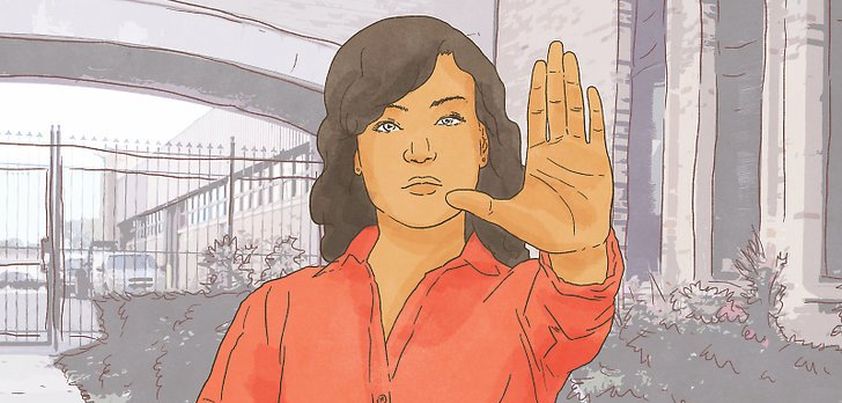 This story explores the dilemma of a teacher who, having been raped by a trusted tutor at fourteen years of age, must face the attacker again as her school’s new headmaster. She refuses to cower before the man, and manages to maintain her dignity and self-respect through two encounters. Naguib Mahfouz is one of the few Islamic writers with the reputation to be able to not only successfully take on such a confronting issue, but also present it from an openly feminist perspective. Themes: abuse of trust, sexual assault, strength of character, courage, empowerment. More…
This story explores the dilemma of a teacher who, having been raped by a trusted tutor at fourteen years of age, must face the attacker again as her school’s new headmaster. She refuses to cower before the man, and manages to maintain her dignity and self-respect through two encounters. Naguib Mahfouz is one of the few Islamic writers with the reputation to be able to not only successfully take on such a confronting issue, but also present it from an openly feminist perspective. Themes: abuse of trust, sexual assault, strength of character, courage, empowerment. More…
Popular Mechanics (Mine / Little Things)
 As anyone who has witnessed an acrimonious divorce knows, sometimes demands over property settlement and custody of children defy logic. This is often because discussions are driven by anger and a desire to hurt or “get back at” the other party as opposed to fairness and what is best for all. In this short story by Raymond Carver, the only major point of argument seems to be which parent will be the main carer for the couple’s baby. Unfortunately, the simple mechanics of a newly formed human body lead to a “Solomon-like” solution that will not please either of them. More…
As anyone who has witnessed an acrimonious divorce knows, sometimes demands over property settlement and custody of children defy logic. This is often because discussions are driven by anger and a desire to hurt or “get back at” the other party as opposed to fairness and what is best for all. In this short story by Raymond Carver, the only major point of argument seems to be which parent will be the main carer for the couple’s baby. Unfortunately, the simple mechanics of a newly formed human body lead to a “Solomon-like” solution that will not please either of them. More…
The New Food
 The climax of this very short story is the gruesome death of an imaginary baby. If you did not know who wrote it, you might attribute the plot to the playful, postmodernist style of an author like Donald Barthelme. In fact, the story was published way back in 1910. It comes from Canadian humorist Stephen Leacock’s first short story collection, Literary Lapses. A fascinating aspect of the story is its modern relevance. Viewed in the context of today’s world, the story is a wonderful satire of heavily processed convenience foods and the contribution they make towards child obesity. More…
The climax of this very short story is the gruesome death of an imaginary baby. If you did not know who wrote it, you might attribute the plot to the playful, postmodernist style of an author like Donald Barthelme. In fact, the story was published way back in 1910. It comes from Canadian humorist Stephen Leacock’s first short story collection, Literary Lapses. A fascinating aspect of the story is its modern relevance. Viewed in the context of today’s world, the story is a wonderful satire of heavily processed convenience foods and the contribution they make towards child obesity. More…
The Extravagant Behavior of the Naked Woman
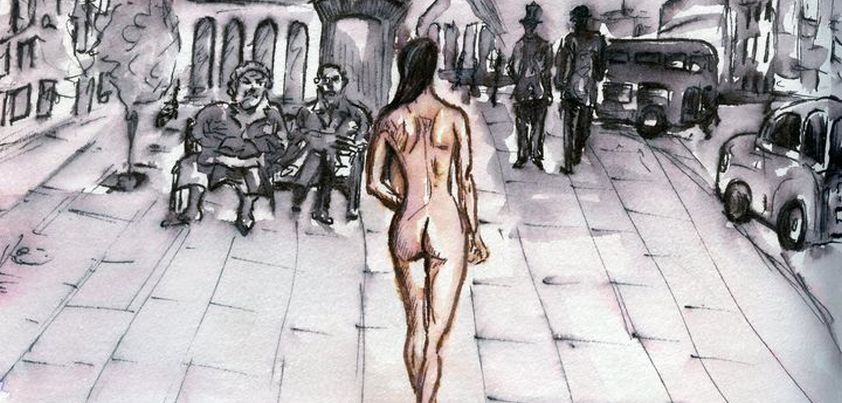 This very short story from Josefina Estrada appears in several international flash fiction anthologies. Its shock value helps to get across a number of important themes. Some are stated or can readily be implied: the woman is clearly suffering some sort of mental condition, but the community and police do not have access to services or facilities to help her. Other than a few lustful men, it is easier to turn away and pretend she does not exist. A less obvious theme lies in the question: What would happen if it were a wild-looking man walking naked through the streets? More…
This very short story from Josefina Estrada appears in several international flash fiction anthologies. Its shock value helps to get across a number of important themes. Some are stated or can readily be implied: the woman is clearly suffering some sort of mental condition, but the community and police do not have access to services or facilities to help her. Other than a few lustful men, it is easier to turn away and pretend she does not exist. A less obvious theme lies in the question: What would happen if it were a wild-looking man walking naked through the streets? More…
Rex Ex Machina
 The Latin phrase used as the title of this story by Frederic Max gives away a little about the plot. Rex Ex Machina translates as King from Machine. The story comprises a letter from a dying man to his only son. There is nothing at all sentimental about the letter… the word “love” isn’t even mentioned! Rather, it explains something that the man has been hiding from his son for almost forty years. It tells how he had once trained as a spy and been sent on a top-secret mission to destroy a machine that threatened the free world. More…
The Latin phrase used as the title of this story by Frederic Max gives away a little about the plot. Rex Ex Machina translates as King from Machine. The story comprises a letter from a dying man to his only son. There is nothing at all sentimental about the letter… the word “love” isn’t even mentioned! Rather, it explains something that the man has been hiding from his son for almost forty years. It tells how he had once trained as a spy and been sent on a top-secret mission to destroy a machine that threatened the free world. More…
The School
 Strange things are happening in the school featured in this story by Donald Barthelme. First, all plants and animals in student projects die. Death seems to be everywhere when an adopted dog, sponsored Korean orphan, and higher than average numbers of parents pass on. Then, to cap it all off, two students are killed in an accident while playing on a building site. In order to experience renewal of life, students ask their teacher to demonstrate sex with his teaching assistant. But just as they kiss and things start to get interesting, something happens that makes the children cheer wildly. More…
Strange things are happening in the school featured in this story by Donald Barthelme. First, all plants and animals in student projects die. Death seems to be everywhere when an adopted dog, sponsored Korean orphan, and higher than average numbers of parents pass on. Then, to cap it all off, two students are killed in an accident while playing on a building site. In order to experience renewal of life, students ask their teacher to demonstrate sex with his teaching assistant. But just as they kiss and things start to get interesting, something happens that makes the children cheer wildly. More…
The Chaser
 On the surface, John Collier’s The Chaser is a light-hearted story about a young man looking to buy a love potion to enchant the woman of his dreams. However, in the old man’s final words Au revoir (goodbye until we meet again), we realize that the story may be the rising action in a longer plot. A major theme is manipulation. Alan is being as cruelly manipulated as he hopes to manipulate Diana. Other themes: true love vs. obsessive desire, equality vs. servility in relationships, morality (lack of respect for and destruction of Diana’s identity, murder as a solution). More…
On the surface, John Collier’s The Chaser is a light-hearted story about a young man looking to buy a love potion to enchant the woman of his dreams. However, in the old man’s final words Au revoir (goodbye until we meet again), we realize that the story may be the rising action in a longer plot. A major theme is manipulation. Alan is being as cruelly manipulated as he hopes to manipulate Diana. Other themes: true love vs. obsessive desire, equality vs. servility in relationships, morality (lack of respect for and destruction of Diana’s identity, murder as a solution). More…
The Death of a Government Clerk
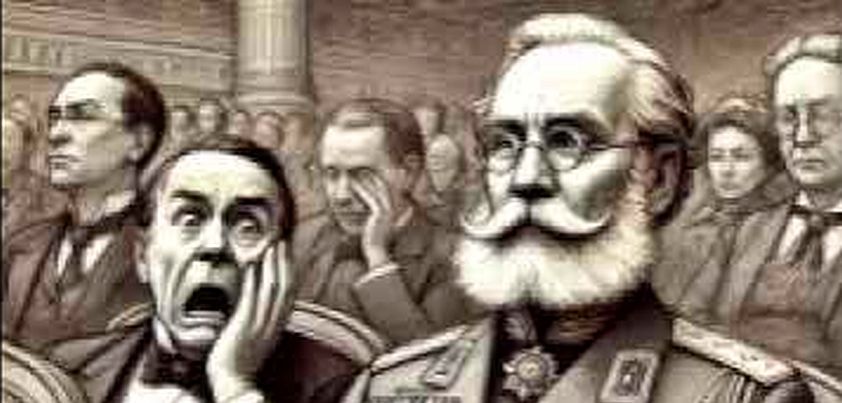 In this playful story by Anton Chekhov, a government clerk enjoying a night at the opera is dismayed when an unexpected sneeze lands droplets on the bald head of a civilian General. Although his immediate apology is accepted, the clerk not only makes a nuisance of himself with continued apologies during the performance, but pesters the general over the next two days trying to explain what happened. As the general becomes increasingly angry, the clerk becomes increasingly anxious until the stress gets too much for him. Themes include social class (living in fear), guilt, insecurity, paranoia, anxiety. More…
In this playful story by Anton Chekhov, a government clerk enjoying a night at the opera is dismayed when an unexpected sneeze lands droplets on the bald head of a civilian General. Although his immediate apology is accepted, the clerk not only makes a nuisance of himself with continued apologies during the performance, but pesters the general over the next two days trying to explain what happened. As the general becomes increasingly angry, the clerk becomes increasingly anxious until the stress gets too much for him. Themes include social class (living in fear), guilt, insecurity, paranoia, anxiety. More…
A Face in the Dark
 The power of this very short horror story from Ruskin Bond is in the way the events described mirror what one might experience in a nightmare. As an alternative to supernatural forces, Bond cleverly presents a logical explanation for the night’s events: the way faces can appear ghostly by torchlight. Either way, the major theme of the story is fear when confronted with the unknown. A possible moral is that we shouldn’t judge people who look or dress differently due to their race, class, gender identity, religion, etc. Other themes include the supernatural and imagination vs. reality. More…
The power of this very short horror story from Ruskin Bond is in the way the events described mirror what one might experience in a nightmare. As an alternative to supernatural forces, Bond cleverly presents a logical explanation for the night’s events: the way faces can appear ghostly by torchlight. Either way, the major theme of the story is fear when confronted with the unknown. A possible moral is that we shouldn’t judge people who look or dress differently due to their race, class, gender identity, religion, etc. Other themes include the supernatural and imagination vs. reality. More…
Parallel Universes
 The title of this Etgar Keret story describes his writing, which takes readers on humorous, often shocking journeys to worlds so absurd they could only exist outside our own. Keret developed a special interest in parallel universe theory when told that thinking about them helped his father get through the privations of Jewish persecution in World War 2 Europe. Although Parallel Universes fits the Keret mould in terms of the absurd contrasts between the described worlds, it is also a poignant love story that ends: I enjoy knowing there’s one place … where I’m falling asleep happy. More…
The title of this Etgar Keret story describes his writing, which takes readers on humorous, often shocking journeys to worlds so absurd they could only exist outside our own. Keret developed a special interest in parallel universe theory when told that thinking about them helped his father get through the privations of Jewish persecution in World War 2 Europe. Although Parallel Universes fits the Keret mould in terms of the absurd contrasts between the described worlds, it is also a poignant love story that ends: I enjoy knowing there’s one place … where I’m falling asleep happy. More…
Oliver’s Evolution
 In this story by John Updike, a troublesome toddler who had come late in his parents’ little pack of offspring is loved, but not enough to prevent his near death. Later, as a child, he is still loved, but not enough to detect a “sleepy” eye in time to fix it. After his parents divorce, there is even less love for the troubled teen who gets bad grades, abandons jobs and misses opportunities. Fortunately, after marrying an equally troubled girl, he transforms into a responsible, loving husband and father. Themes include parent-child relationships, neglect, responsibility, personal growth. More…
In this story by John Updike, a troublesome toddler who had come late in his parents’ little pack of offspring is loved, but not enough to prevent his near death. Later, as a child, he is still loved, but not enough to detect a “sleepy” eye in time to fix it. After his parents divorce, there is even less love for the troubled teen who gets bad grades, abandons jobs and misses opportunities. Fortunately, after marrying an equally troubled girl, he transforms into a responsible, loving husband and father. Themes include parent-child relationships, neglect, responsibility, personal growth. More…
Oysters
 In this story by Anton Chekhov a young boy so weak from hunger that he can barely stand sees a sign in a restaurant advertising oysters. He knows that oysters are some kind of seafood. However, he does not know what they look like. In his hunger-affected state, the boy imagines himself eating creatures half-way between a crab and a frog. He then pictures himself eating up everything around him. He suddenly comes back to earth when two rich “gentlemen” agree to introduce him to the real thing. Themes include poverty, social class, insensitivity, shame, false pride, vanity, unconditional love. More…
In this story by Anton Chekhov a young boy so weak from hunger that he can barely stand sees a sign in a restaurant advertising oysters. He knows that oysters are some kind of seafood. However, he does not know what they look like. In his hunger-affected state, the boy imagines himself eating creatures half-way between a crab and a frog. He then pictures himself eating up everything around him. He suddenly comes back to earth when two rich “gentlemen” agree to introduce him to the real thing. Themes include poverty, social class, insensitivity, shame, false pride, vanity, unconditional love. More…
Cat in the Rain
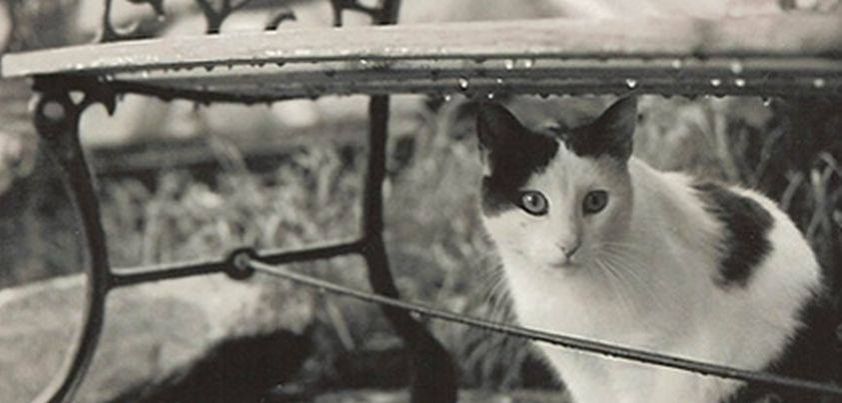 On the surface, this story by Ernest Hemingway is a simple tale about a couple spending a rainy afternoon in a hotel room during an Italian holiday. The woman feels pity for a cat trying to stay dry under an outside table. Readers often interpret this as a symbol of the woman feeling trapped in an empty relationship. Possible causes include a lack of mutual love and respect, incompatibility, and the woman’s childishness and greed. Themes include the aftermath of war, kindness, communication breakdown, isolation and loneliness, boredom and disappointment, gender roles and femininity, dissatisfaction and unfulfilled desires. More…
On the surface, this story by Ernest Hemingway is a simple tale about a couple spending a rainy afternoon in a hotel room during an Italian holiday. The woman feels pity for a cat trying to stay dry under an outside table. Readers often interpret this as a symbol of the woman feeling trapped in an empty relationship. Possible causes include a lack of mutual love and respect, incompatibility, and the woman’s childishness and greed. Themes include the aftermath of war, kindness, communication breakdown, isolation and loneliness, boredom and disappointment, gender roles and femininity, dissatisfaction and unfulfilled desires. More…
Neighbours
 The underlying message of this heart-warming story by Tim Winton is the importance of cultural acceptance in a multicultural environment. A naïve Australian couple initially feel uncomfortable when they move into their first home and find that their street is full of European migrants. Despite language barriers, as time goes by the couple and migrants develop a mutual understanding, friendships and a sense of community. This culminates in a tearful scene where a migrant family gathers at their fence to cheer on the home-birth of the couple’s first child. Themes include prejudice, cultural differences, understanding, acceptance, friendship and community. More…
The underlying message of this heart-warming story by Tim Winton is the importance of cultural acceptance in a multicultural environment. A naïve Australian couple initially feel uncomfortable when they move into their first home and find that their street is full of European migrants. Despite language barriers, as time goes by the couple and migrants develop a mutual understanding, friendships and a sense of community. This culminates in a tearful scene where a migrant family gathers at their fence to cheer on the home-birth of the couple’s first child. Themes include prejudice, cultural differences, understanding, acceptance, friendship and community. More…
Vision out of the Corner of One Eye
 Two frequent themes in Luisa Valenzuela’s short stories are the daily violence associated with living in 1960/70s Argentina and feminism. This is one of the latter, satirizing gender imbalance and “Machismo” in society. A woman traveling on a crowded bus feels herself being groped. When she tries to move away, more people get on the bus and the groping develops into “fondling” and “jiggling”. Rather than make a scene, she gives the pervert some of his own medicine and more… rubbing his behind and expertly removing his wallet in the process. Themes include sexual assault, indignation, distress, doubt, revenge, theft. More…
Two frequent themes in Luisa Valenzuela’s short stories are the daily violence associated with living in 1960/70s Argentina and feminism. This is one of the latter, satirizing gender imbalance and “Machismo” in society. A woman traveling on a crowded bus feels herself being groped. When she tries to move away, more people get on the bus and the groping develops into “fondling” and “jiggling”. Rather than make a scene, she gives the pervert some of his own medicine and more… rubbing his behind and expertly removing his wallet in the process. Themes include sexual assault, indignation, distress, doubt, revenge, theft. More…
The Thakur’s Well / Thakur Ka Kuan
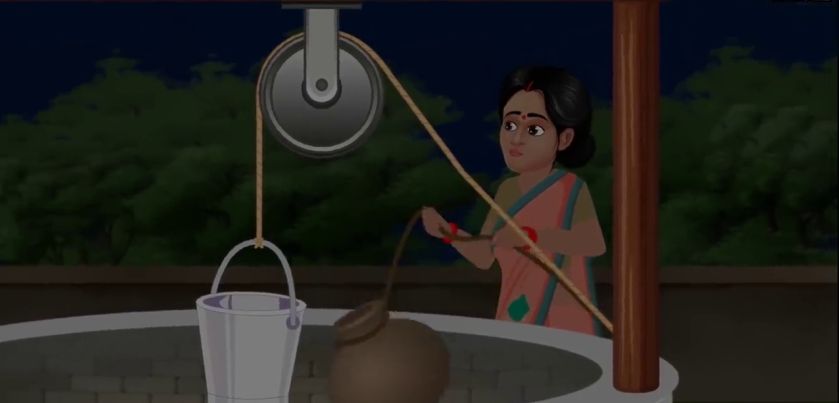 This poignant story by Premchand highlights the degrading treatment of Dalits (untouchables) under India’s caste system.A woman brings water for her sick husband from the only well in the village available to Dalits. It is contaminated and has a foul smell. She doesn’t know that boiling will purify the water, and decides that her only option is to risk a severe beating by secretly drawing water from the well of the high-caste Thakur, who forbids low-caste villagers from using it. Themes include social class, discrimination, poverty, courage, gender roles, corruption of the upper classes. More…
This poignant story by Premchand highlights the degrading treatment of Dalits (untouchables) under India’s caste system.A woman brings water for her sick husband from the only well in the village available to Dalits. It is contaminated and has a foul smell. She doesn’t know that boiling will purify the water, and decides that her only option is to risk a severe beating by secretly drawing water from the well of the high-caste Thakur, who forbids low-caste villagers from using it. Themes include social class, discrimination, poverty, courage, gender roles, corruption of the upper classes. More…
He-y, Come On Ou-t!
 In this parable by Shinichi Hoshi, a landslide opens up a seemingly bottomless hole in the ground. A businessman obtains the rights to fill the hole. He gets permission to dispose of toxic waste, and soon hazardous materials from nuclear power plants and contagious disease experiments are being poured into the hole along with domestic waste and classified government documents from a nearby city. The city and ocean are cleaner, and even the sky seems clearer than before. That is until a workman atop a tall city building hears a voice from above shouting: He-y, come on ou-t! More…
In this parable by Shinichi Hoshi, a landslide opens up a seemingly bottomless hole in the ground. A businessman obtains the rights to fill the hole. He gets permission to dispose of toxic waste, and soon hazardous materials from nuclear power plants and contagious disease experiments are being poured into the hole along with domestic waste and classified government documents from a nearby city. The city and ocean are cleaner, and even the sky seems clearer than before. That is until a workman atop a tall city building hears a voice from above shouting: He-y, come on ou-t! More…
A Respectable Woman
 Kate Chopin’s ‘respectable woman’ is happily married and looking forward to spending quality time with her husband. She is so disappointed when he invites an old school friend to visit that she decides to be polite but not friendly towards him. At first, the two barely communicate. However, there is a growing chemistry between them. This disturbs the woman, who finds an excuse to visit an Aunt for the remainder of his stay. When the woman learns the man will visit again, she tells her husband: I have overcome everything! Overcome what? Does she plan to remain a ‘respectable woman’? More…
Kate Chopin’s ‘respectable woman’ is happily married and looking forward to spending quality time with her husband. She is so disappointed when he invites an old school friend to visit that she decides to be polite but not friendly towards him. At first, the two barely communicate. However, there is a growing chemistry between them. This disturbs the woman, who finds an excuse to visit an Aunt for the remainder of his stay. When the woman learns the man will visit again, she tells her husband: I have overcome everything! Overcome what? Does she plan to remain a ‘respectable woman’? More…
Annie’s Day
 Andy Weir’s Annie is a bad girl who sleeps around and likes to play nasty pranks on people. Whenever she has a free night she sleeps with Paul, whose wife has left him. However, she has two problems with Paul. First, he is a morning person and she is a night owl. He wakes at 6.00am every day while she doesn’t like getting up until 10.00am at the earliest. More importantly, there is a big age difference between them. Her dream, which she achieves in the story, is to sleep with Paul’s sixteen-year-old son. More…
Andy Weir’s Annie is a bad girl who sleeps around and likes to play nasty pranks on people. Whenever she has a free night she sleeps with Paul, whose wife has left him. However, she has two problems with Paul. First, he is a morning person and she is a night owl. He wakes at 6.00am every day while she doesn’t like getting up until 10.00am at the earliest. More importantly, there is a big age difference between them. Her dream, which she achieves in the story, is to sleep with Paul’s sixteen-year-old son. More…
The Spider Thread
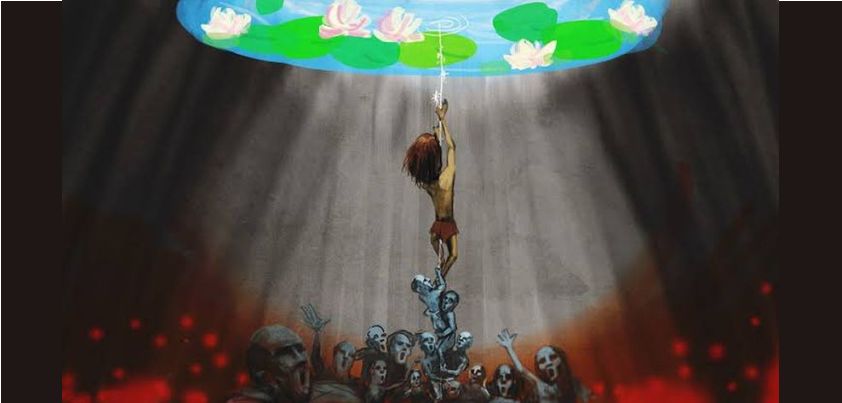 Although initially published in a children’s magazine, this story from Ryūnosuke Akutagawa is equally relevant to adults. Lord Buddha takes pity on a notorious criminal and sends a “life-line” in the form of a spider’s thread to help him escape from hell. For young readers, this is a parable about selfishness and sharing. For older readers, it is also a lesson on compassion. Kandata’s fate was sealed well before he screamed at those following to get off “his” thread. True compassion would have involved finding a way to share the thread with fellow sufferers before he started climbing. More…
Although initially published in a children’s magazine, this story from Ryūnosuke Akutagawa is equally relevant to adults. Lord Buddha takes pity on a notorious criminal and sends a “life-line” in the form of a spider’s thread to help him escape from hell. For young readers, this is a parable about selfishness and sharing. For older readers, it is also a lesson on compassion. Kandata’s fate was sealed well before he screamed at those following to get off “his” thread. True compassion would have involved finding a way to share the thread with fellow sufferers before he started climbing. More…
Born of Man and Woman
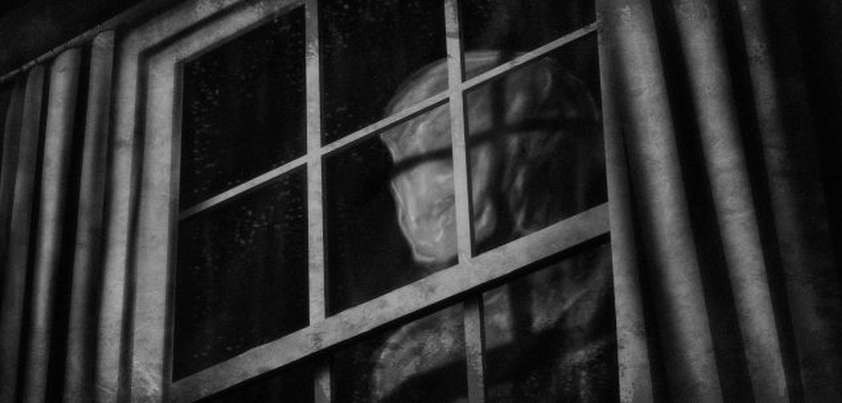 In this moving story by Richard Matheson, what appears to be a mutant eight-year-old child has been locked in a basement for most of its life because of his/her monstrous form and size. The child does not appear to be possessed by an evil or supernatural force and is inquisitive about the outside world. Sadly, it is beaten every time he/she ventures upstairs or attempts to look outside. The horror aspect comes from the cruelty the child suffers and the threat of impending violence if it continues. Themes include appearance, alienation, isolation and loneliness, desire for acceptance, cruelty, retaliation. More…
In this moving story by Richard Matheson, what appears to be a mutant eight-year-old child has been locked in a basement for most of its life because of his/her monstrous form and size. The child does not appear to be possessed by an evil or supernatural force and is inquisitive about the outside world. Sadly, it is beaten every time he/she ventures upstairs or attempts to look outside. The horror aspect comes from the cruelty the child suffers and the threat of impending violence if it continues. Themes include appearance, alienation, isolation and loneliness, desire for acceptance, cruelty, retaliation. More…
Sleeping
 In this story by Katharine Weber, a young girl is hired by a couple she has never met before to baby-sit while they go to the movies. They tell her the baby is a very sound sleeper and won’t need to be fed or changed. In addition, that she mustn’t open the door because it squeaks and will wake the baby. As the evening wears on, she becomes curious. She listens at the door and hears nothing. She gently tries the door but it seems locked. When the father drives her home, he asks a question that explains the mystery. More…
In this story by Katharine Weber, a young girl is hired by a couple she has never met before to baby-sit while they go to the movies. They tell her the baby is a very sound sleeper and won’t need to be fed or changed. In addition, that she mustn’t open the door because it squeaks and will wake the baby. As the evening wears on, she becomes curious. She listens at the door and hears nothing. She gently tries the door but it seems locked. When the father drives her home, he asks a question that explains the mystery. More…
Incarnations of Burned Children
 If you haven’t read anything by David Foster Wallace before, this is a good story to start with. Known for his long, intricate passages including many seemingly inconsequential details, the story is a single paragraph of over 1,100 words. In one of a parent’s worst nightmares, a toddler is scalded by a fallen pot of boiling water. Its father reacts quickly, going through stages of calmness, anger and panic as he realizes he missed a crucial detail that may ruin the child’s future. Themes include parenthood, neglect, pain and suffering, blame, regret. More…
If you haven’t read anything by David Foster Wallace before, this is a good story to start with. Known for his long, intricate passages including many seemingly inconsequential details, the story is a single paragraph of over 1,100 words. In one of a parent’s worst nightmares, a toddler is scalded by a fallen pot of boiling water. Its father reacts quickly, going through stages of calmness, anger and panic as he realizes he missed a crucial detail that may ruin the child’s future. Themes include parenthood, neglect, pain and suffering, blame, regret. More…
Answer
 A goodreads.com reviewer aptly describes Answer by Fredric Brown as one of the most concise SciFi horror stories I have ever read. There are uncanny similarities between the new supercomputer’s response to the first question asked of it and the final sentence of Isaac Asimov’s The Last Question. Both stories were published in the mid-1950s and reflect concerns about the future influence of computers on society. Some reviewers suggest that Brown’s one cybernetics machine that combines all the knowledge of all the galaxies already exists… it’s called the Internet! Themes include scientific hubris, the dangers of technology, unintended consequences. More…
A goodreads.com reviewer aptly describes Answer by Fredric Brown as one of the most concise SciFi horror stories I have ever read. There are uncanny similarities between the new supercomputer’s response to the first question asked of it and the final sentence of Isaac Asimov’s The Last Question. Both stories were published in the mid-1950s and reflect concerns about the future influence of computers on society. Some reviewers suggest that Brown’s one cybernetics machine that combines all the knowledge of all the galaxies already exists… it’s called the Internet! Themes include scientific hubris, the dangers of technology, unintended consequences. More…
The Cranes
 Peter Meinke’s The Cranes is a story about enduring love. Both members of a frail, elderly couple suffer from serious medical issues that have destroyed their quality of life. The woman appears to be the sicker of the two, and may be terminally ill. They reflect on their lives together as they sit in their car near some isolated marshland. As they talk, they observe two aged whooping cranes feeding along the shoreline. These birds, which are long-lived and mate for life, symbolize the couple. As a shot rings out, the cranes soar into the sky. More…
Peter Meinke’s The Cranes is a story about enduring love. Both members of a frail, elderly couple suffer from serious medical issues that have destroyed their quality of life. The woman appears to be the sicker of the two, and may be terminally ill. They reflect on their lives together as they sit in their car near some isolated marshland. As they talk, they observe two aged whooping cranes feeding along the shoreline. These birds, which are long-lived and mate for life, symbolize the couple. As a shot rings out, the cranes soar into the sky. More…
The Visitor
 This flash story by Lydia Davis starts with the narrator foreshadowing a visitor to his/her home who will require around the clock care and attention. The visit reminds the narrator of two similar experiences, one by a family member and the other by a friend. In both cases, healthy old men with whom they were living deteriorated physically to the point that their bodily functions collapsed and they became dependent on others for their day-to-day care and well-being. The story takes an unexpected twist in the heart-warming final paragraph, where the narrator reminds us of the circle of life. More…
This flash story by Lydia Davis starts with the narrator foreshadowing a visitor to his/her home who will require around the clock care and attention. The visit reminds the narrator of two similar experiences, one by a family member and the other by a friend. In both cases, healthy old men with whom they were living deteriorated physically to the point that their bodily functions collapsed and they became dependent on others for their day-to-day care and well-being. The story takes an unexpected twist in the heart-warming final paragraph, where the narrator reminds us of the circle of life. More…
The Flowers
 In this “coming of age” story from Alice Walker, a ten-year-old farm girl finds the decomposed body of a decapitated man while collecting flowers in a field. Surprisingly, this doesn’t seem to faze her; she gazes around the spot with interest, then stoops to pick a wild rose. It is not until she notices something else on the ground that we are told her summer was over. As a testament to Walker’s talent, the story contains no dialogue and minimal narrator interpretation of the girl’s emotions; changes in mood and atmosphere are almost solely engendered through actions and setting. More…
In this “coming of age” story from Alice Walker, a ten-year-old farm girl finds the decomposed body of a decapitated man while collecting flowers in a field. Surprisingly, this doesn’t seem to faze her; she gazes around the spot with interest, then stoops to pick a wild rose. It is not until she notices something else on the ground that we are told her summer was over. As a testament to Walker’s talent, the story contains no dialogue and minimal narrator interpretation of the girl’s emotions; changes in mood and atmosphere are almost solely engendered through actions and setting. More…
Old Man at the Bridge
 Although a war story, the major theme of this vignette by Ernest Hemingway is not the physical horrors of armed conflict, but rather the psychological impact on the lives of those caught up in its wake. An old man has dedicated his life to caring for several pets. Forced to set them free and flee, he now fears for their safety and sits alone on a bridge, having lost the drive to go on. The narrator, a soldier focused on this duty, reluctantly leaves him to his fate. Other themes include alienation, anxiety, guilt and despair, resignation, duty vs. compassion. More…
Although a war story, the major theme of this vignette by Ernest Hemingway is not the physical horrors of armed conflict, but rather the psychological impact on the lives of those caught up in its wake. An old man has dedicated his life to caring for several pets. Forced to set them free and flee, he now fears for their safety and sits alone on a bridge, having lost the drive to go on. The narrator, a soldier focused on this duty, reluctantly leaves him to his fate. Other themes include alienation, anxiety, guilt and despair, resignation, duty vs. compassion. More…
The Sacrificial Egg
 The major theme of this story by Chinua Achebe is culture clash, as reflected in the changes forced on the Ibo (Igbo) people of South-Eastern Nigeria as they reconciled their traditional values and beliefs with the effects of Westernization under British colonial rule. One of the biggest changes observed by the narrator is the move from a village-based to an urbanized society, which resulted in a resurgence of smallpox. We also learn how some people, including the narrator, try to minimize such conflicts by maintaining a foot in both cultural camps. Other themes include colonialism, tradition, superstition, compromise. More…
The major theme of this story by Chinua Achebe is culture clash, as reflected in the changes forced on the Ibo (Igbo) people of South-Eastern Nigeria as they reconciled their traditional values and beliefs with the effects of Westernization under British colonial rule. One of the biggest changes observed by the narrator is the move from a village-based to an urbanized society, which resulted in a resurgence of smallpox. We also learn how some people, including the narrator, try to minimize such conflicts by maintaining a foot in both cultural camps. Other themes include colonialism, tradition, superstition, compromise. More…
The Autopsy (Dissection)
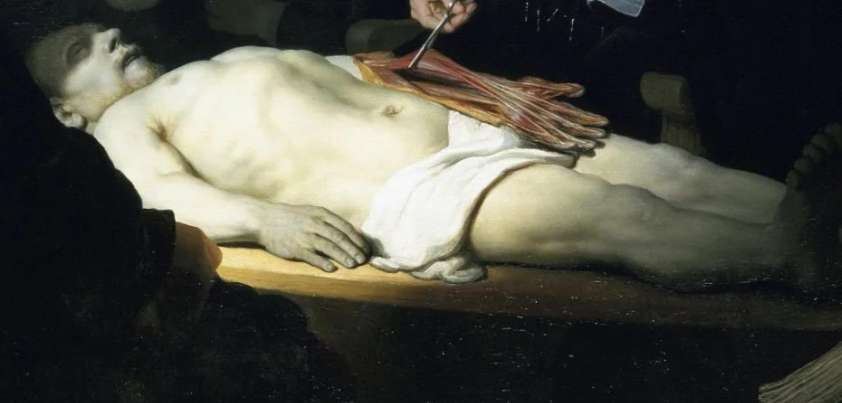 Only an accomplished poet like Georg Heym could tastefully write such an absorbing vignette about the dissection of a human body. This early example of expressionist literature (written a year before Kafka’s The Judgement) describes the procedure in the form of a prose poem. Extensive use of literary devices softens the gore and lends a surreal quality to the story. The backstory of love and beauty humanizes the dead man, making the juxtaposition in the final sentence (the dead man quivered in happiness … while the … doctors broke open the bones of his temple) seem all the more powerful. More…
Only an accomplished poet like Georg Heym could tastefully write such an absorbing vignette about the dissection of a human body. This early example of expressionist literature (written a year before Kafka’s The Judgement) describes the procedure in the form of a prose poem. Extensive use of literary devices softens the gore and lends a surreal quality to the story. The backstory of love and beauty humanizes the dead man, making the juxtaposition in the final sentence (the dead man quivered in happiness … while the … doctors broke open the bones of his temple) seem all the more powerful. More…
The Pedestrian
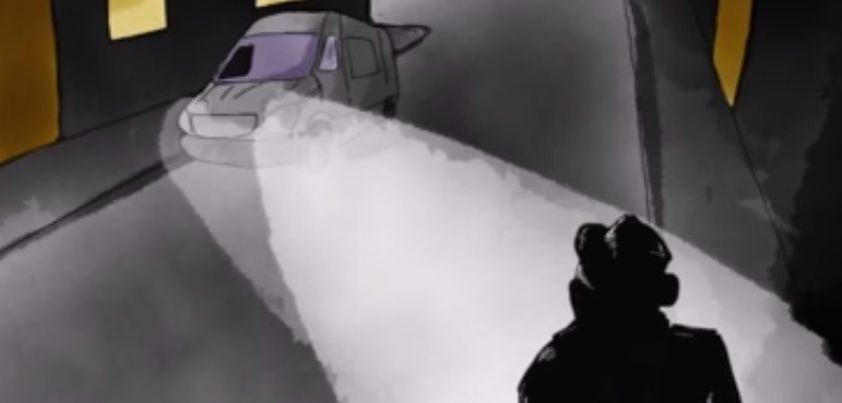 This is our second Ray Bradbury story that questions the social effects of television (the first being The Veldt). Set in 2053, almost everyone stays indoors all night watching TV. Leonard Mead doesn’t. He enjoys going out for a long walk every evening. This is so unusual that the only police car patrolling the empty streets arrests him for his “regressive tendencies”. Fortunately, Bradbury’s predictions about TV were wrong. However, something far more dangerous may be replacing it: social networking on mobile devices! Themes include social dysfunction, dehumanization through technology, conformity vs. individualism, surveillance and control, isolation, disconnection from nature. More…
This is our second Ray Bradbury story that questions the social effects of television (the first being The Veldt). Set in 2053, almost everyone stays indoors all night watching TV. Leonard Mead doesn’t. He enjoys going out for a long walk every evening. This is so unusual that the only police car patrolling the empty streets arrests him for his “regressive tendencies”. Fortunately, Bradbury’s predictions about TV were wrong. However, something far more dangerous may be replacing it: social networking on mobile devices! Themes include social dysfunction, dehumanization through technology, conformity vs. individualism, surveillance and control, isolation, disconnection from nature. More…
Indian Camp
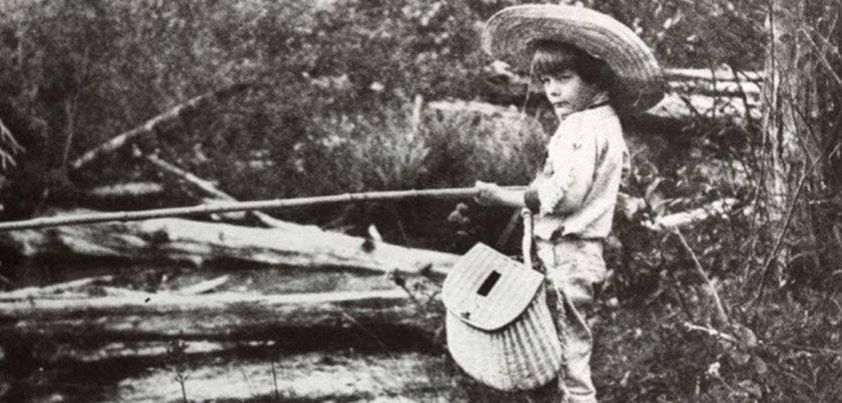 This story by Ernest Hemingway tells how a young boy ‘comes of age’ as he witnesses the saving of a woman’s life, the birth of her baby, and the death of her husband – all in the space of just a few hours. A feature of Hemingway’s short stories is that he often leaves important details open to the reader’s interpretation. In this story, we come away wondering why the woman’s husband killed himself. Some people suggest that the boy’s Uncle George may have had something to do with it. Themes: birth and death, suffering, masculinity, suicide. More…
This story by Ernest Hemingway tells how a young boy ‘comes of age’ as he witnesses the saving of a woman’s life, the birth of her baby, and the death of her husband – all in the space of just a few hours. A feature of Hemingway’s short stories is that he often leaves important details open to the reader’s interpretation. In this story, we come away wondering why the woman’s husband killed himself. Some people suggest that the boy’s Uncle George may have had something to do with it. Themes: birth and death, suffering, masculinity, suicide. More…
My Jockey
 Today we have what is probably the best-known (and shortest!) story of Lucia Berlin. Although not much more than a snippet, it is a wonderful example of the descriptive and emotive power of her writing. Set in a hospital, the protagonist is an emergency room nurse who finds “connection” in the broken bodies and needs of the real men who come into her care. Her favorites (the most broken) are the jockeys, and her favorite among these is Muñoz whose pain results in her comforting and cradling him like a baby. Themes: loneliness, human connection, empathy, motherhood. More…
Today we have what is probably the best-known (and shortest!) story of Lucia Berlin. Although not much more than a snippet, it is a wonderful example of the descriptive and emotive power of her writing. Set in a hospital, the protagonist is an emergency room nurse who finds “connection” in the broken bodies and needs of the real men who come into her care. Her favorites (the most broken) are the jockeys, and her favorite among these is Muñoz whose pain results in her comforting and cradling him like a baby. Themes: loneliness, human connection, empathy, motherhood. More…
In the Family
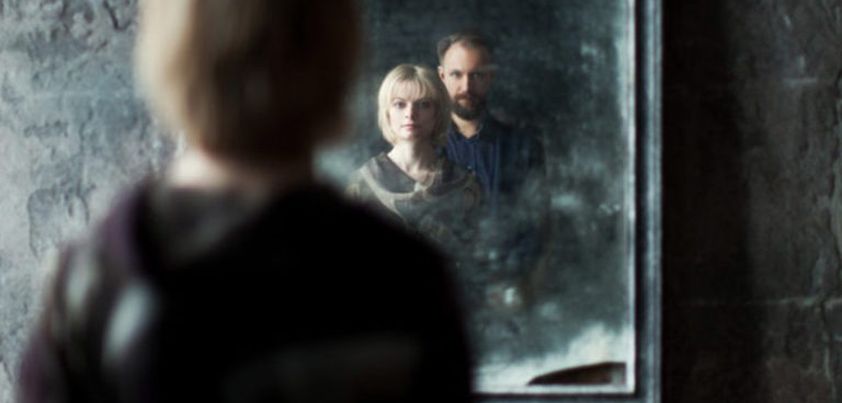 This story from Cuban writer María Elena Llana uses a combination of humour and magical realty to highlight the potentially fatal consequences of pride. The victim (Clara), having excelled at university but never bothered to look for work, seems to think her formal education puts her above other family members. One evening, while “holding court” over dinner with her extended family (both living and dead) she learns the error of her ways. The next day she finds herself sitting on the other (dead family’s) side of the table. Themes: pride, acceptance of the unusual, the supernatural. More…
This story from Cuban writer María Elena Llana uses a combination of humour and magical realty to highlight the potentially fatal consequences of pride. The victim (Clara), having excelled at university but never bothered to look for work, seems to think her formal education puts her above other family members. One evening, while “holding court” over dinner with her extended family (both living and dead) she learns the error of her ways. The next day she finds herself sitting on the other (dead family’s) side of the table. Themes: pride, acceptance of the unusual, the supernatural. More…
A City of Churches
 This story begins with a woman talking to a realtor about moving to the city of Prester to open a car rental business. As they talk, she notices that every building in the city is a church of some kind. Typical of Donald Barthelme, things get stranger. Nobody rents cars in Prester, but the city has a problem. It needs a girl to work in its car-rental agency to make the town ‘complete’. The girl has a special talent; she can will her dreams. When told she cannot leave, she threatens to dream the life [they] are most afraid of. More…
This story begins with a woman talking to a realtor about moving to the city of Prester to open a car rental business. As they talk, she notices that every building in the city is a church of some kind. Typical of Donald Barthelme, things get stranger. Nobody rents cars in Prester, but the city has a problem. It needs a girl to work in its car-rental agency to make the town ‘complete’. The girl has a special talent; she can will her dreams. When told she cannot leave, she threatens to dream the life [they] are most afraid of. More…
The Mouse
 This story by Saki satirizes the social sensitivities of the late-Victorian/Edwardian middle class. A prudish young man who has had a sheltered upbringing returns to the city from a farm visit. Sharing his train compartment is a woman who appears to be sleeping. He soon finds they are not alone… he has a mouse in his pants! To avoid offending the woman and causing a scene, he removes his trousers by hiding behind a blanket. Unfortunately, the blanket falls before can he put them on again and the woman wakes up. Themes include propriety, embarrassment, dissimulation, insensitivity towards others. More…
This story by Saki satirizes the social sensitivities of the late-Victorian/Edwardian middle class. A prudish young man who has had a sheltered upbringing returns to the city from a farm visit. Sharing his train compartment is a woman who appears to be sleeping. He soon finds they are not alone… he has a mouse in his pants! To avoid offending the woman and causing a scene, he removes his trousers by hiding behind a blanket. Unfortunately, the blanket falls before can he put them on again and the woman wakes up. Themes include propriety, embarrassment, dissimulation, insensitivity towards others. More…
The Werewolf
 This is the first of Angela Carter’s well-known “wolf tales” series. Although the beginning resembles the Red Riding Hood children’s story, things soon take a very different turn. A wolf loses a paw, grandma is missing a hand, and the villagers show their bravery by beating the poor woman to death. What I particularly like is the way that Carter uses foreshadowing and omissions in the story-line to leave readers with a question: Was the grandmother really a witch/were-woman, or was the “good child” one of those northern country people with a cold heart mentioned in the opening sentence? More…
This is the first of Angela Carter’s well-known “wolf tales” series. Although the beginning resembles the Red Riding Hood children’s story, things soon take a very different turn. A wolf loses a paw, grandma is missing a hand, and the villagers show their bravery by beating the poor woman to death. What I particularly like is the way that Carter uses foreshadowing and omissions in the story-line to leave readers with a question: Was the grandmother really a witch/were-woman, or was the “good child” one of those northern country people with a cold heart mentioned in the opening sentence? More…
The Far and the Near
 This story from Thomas Wolfe is about perception, connection and disappointment. A railway engineer works the same route for over twenty years. Every day, he pays particular attention to a small, well-kept farmhouse from which a woman, and later a woman and child, emerge to wave cheerfully as the train passes. He feels a special connection with them, which helps through the monotony and occasional tragedies encountered in his work. On retirement, he decides to pay the woman a visit. This does not go as he had planned. Themes: appearances, false assumptions, confusion, isolation, suspicion, disillusionment, regret. More…
This story from Thomas Wolfe is about perception, connection and disappointment. A railway engineer works the same route for over twenty years. Every day, he pays particular attention to a small, well-kept farmhouse from which a woman, and later a woman and child, emerge to wave cheerfully as the train passes. He feels a special connection with them, which helps through the monotony and occasional tragedies encountered in his work. On retirement, he decides to pay the woman a visit. This does not go as he had planned. Themes: appearances, false assumptions, confusion, isolation, suspicion, disillusionment, regret. More…
Snow
 On the surface, Anne Beattie’s Snow is a simple story about a woman’s recollections of a romantic winter in the snow-covered countryside. She doesn’t appear to be speaking directly to the man, so one wonders if she might be writing him a letter, looking at his photograph, or simply re-living events in her mind. The major theme of the story is nostalgia and the nature of memory. She recalls the good times they had together and a bitter-sweet return visit after their parting, but suggests that the man may remember the winter differently. Other themes: storytelling, love, loss. More…
On the surface, Anne Beattie’s Snow is a simple story about a woman’s recollections of a romantic winter in the snow-covered countryside. She doesn’t appear to be speaking directly to the man, so one wonders if she might be writing him a letter, looking at his photograph, or simply re-living events in her mind. The major theme of the story is nostalgia and the nature of memory. She recalls the good times they had together and a bitter-sweet return visit after their parting, but suggests that the man may remember the winter differently. Other themes: storytelling, love, loss. More…
The Rememberer
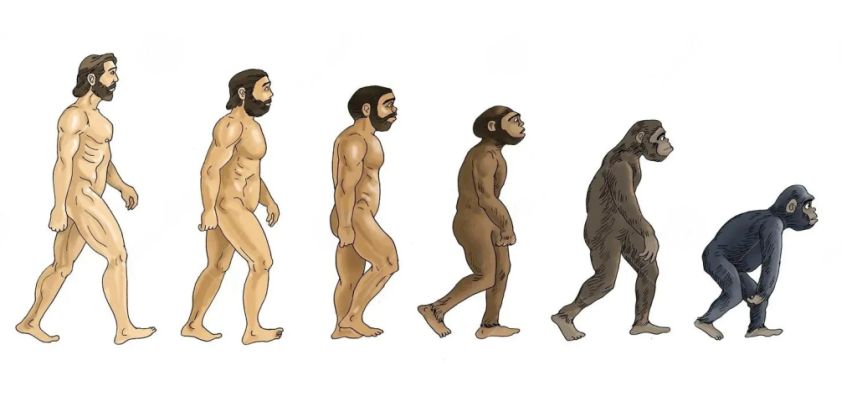 In this story from Aimee Bender, a man who is so sad about the world that he laments thinking about it has a wish come true. For no apparent reason he begins to experience reverse evolution, shedding millions of years a day. He regresses into an ape, then a sea turtle, and finally a small salamander, which his lover frees into the ocean. All she has left is her memories of him, which she clings to because if he’s not here, it’s her job to remember. Themes include overthinking and emotional detachment, love and caregiving, loss and remembrance. More…
In this story from Aimee Bender, a man who is so sad about the world that he laments thinking about it has a wish come true. For no apparent reason he begins to experience reverse evolution, shedding millions of years a day. He regresses into an ape, then a sea turtle, and finally a small salamander, which his lover frees into the ocean. All she has left is her memories of him, which she clings to because if he’s not here, it’s her job to remember. Themes include overthinking and emotional detachment, love and caregiving, loss and remembrance. More…
Can-Can
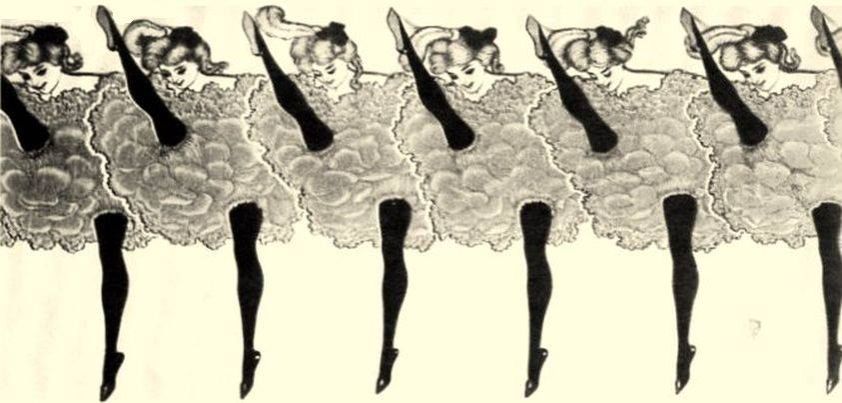 This story by Arturo Vivante is about a happily married family man with a loving, trusting wife. When his wife dances the Can-Can for one of their children, we can see that he also still finds her attractive. He knows she will not question his going out alone for a long drive, even though this is out of character. He has made plans to meet with another woman. It is clear that he has no real love for her, which leads to a question. Why do many happily married men put their marriage and family life at risk like this? More…
This story by Arturo Vivante is about a happily married family man with a loving, trusting wife. When his wife dances the Can-Can for one of their children, we can see that he also still finds her attractive. He knows she will not question his going out alone for a long drive, even though this is out of character. He has made plans to meet with another woman. It is clear that he has no real love for her, which leads to a question. Why do many happily married men put their marriage and family life at risk like this? More…